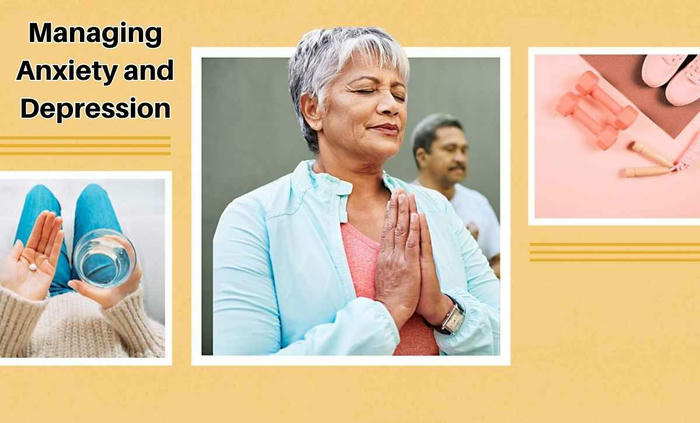Finding Calm in the Storm: Effective Strategies for Anxiety and Depression Relief
Anxiety and depression are two of the most common mental health challenges faced by individuals today. While these conditions can feel overwhelming, there are proven strategies and treatments that can help you regain control and find relief. This article explores practical approaches to managing anxiety and depression, offering hope and guidance for those seeking a path to emotional well-being.
Understanding Anxiety and Depression
What is Anxiety?
Anxiety is a natural response to stress, characterized by feelings of worry, fear, or unease. While occasional anxiety is normal, chronic anxiety can interfere with daily life and lead to physical symptoms such as rapid heartbeat, sweating, and fatigue.
What is Depression?
Depression is a mood disorder that causes persistent feelings of sadness, hopelessness, and a lack of interest in activities. It can affect sleep, appetite, energy levels, and overall quality of life. Both anxiety and depression can coexist, making it essential to address them holistically.

Strategies for Managing Anxiety and Depression
Seek Professional Help
One of the most effective ways to manage anxiety and depression is to seek help from a licensed mental health professional. Therapists, psychologists, and psychiatrists can provide tailored treatment plans, including therapy and medication, to address your specific needs.
Cognitive Behavioral Therapy (CBT)
CBT is a widely used therapeutic approach that helps individuals identify and change negative thought patterns. By learning to reframe thoughts and develop healthier coping mechanisms, CBT can significantly reduce symptoms of anxiety and depression.
Medication
For some individuals, medication prescribed by a healthcare provider can be an essential part of treatment. Antidepressants, anti-anxiety medications, and mood stabilizers can help regulate brain chemistry and alleviate symptoms.

Lifestyle Changes for Mental Health
Regular Exercise
Physical activity has been shown to boost mood and reduce symptoms of anxiety and depression. Activities like walking, yoga, swimming, or even gardening can release endorphins, the body’s natural mood elevators.
Balanced Diet
A healthy diet rich in fruits, vegetables, whole grains, and lean proteins can support brain health and improve emotional well-being. Avoiding excessive caffeine, sugar, and processed foods can also help stabilize mood.
Quality Sleep
Poor sleep can exacerbate anxiety and depression. Establishing a consistent sleep routine, creating a relaxing bedtime environment, and avoiding screens before bed can promote better sleep quality.
Mindfulness and Meditation
Practicing mindfulness and meditation can help you stay present and reduce feelings of stress and worry. Techniques such as deep breathing, guided meditation, and progressive muscle relaxation can be particularly effective.
Building a Support System
Connect with Loved Ones
Maintaining strong relationships with family and friends can provide emotional support and a sense of belonging. Sharing your feelings with trusted individuals can help you feel less isolated.
Join Support Groups
Support groups, whether in-person or online, offer a safe space to connect with others who are experiencing similar challenges. These groups can provide encouragement, understanding, and practical advice.
Volunteer or Engage in Community Activities
Helping others through volunteering or participating in community activities can boost your mood and provide a sense of purpose. It also offers opportunities to build new connections and shift focus away from personal struggles.
Holistic Approaches to Mental Health
Acupuncture and Massage Therapy
Alternative therapies like acupuncture and massage therapy can help reduce stress, improve relaxation, and alleviate symptoms of anxiety and depression. These practices focus on balancing the body’s energy and promoting overall well-being.
Art and Music Therapy

Creative outlets such as art and music therapy can provide a therapeutic way to express emotions and reduce stress. Engaging in creative activities can be both calming and empowering.
Aromatherapy
Essential oils like lavender, chamomile, and bergamot have been shown to promote relaxation and reduce anxiety. Incorporating aromatherapy into your daily routine can create a calming environment.
The Role of Self-Compassion
Practice Self-Kindness
Treat yourself with the same kindness and understanding you would offer a friend. Acknowledge your struggles without judgment and remind yourself that it’s okay to seek help.
Set Realistic Goals
Breaking tasks into smaller, manageable steps can help you feel more in control and reduce feelings of overwhelm. Celebrate small victories along the way.
Limit Negative Self-Talk
Challenge negative thoughts by replacing them with positive affirmations. Focus on your strengths and accomplishments rather than dwelling on perceived failures.
Conclusion
Managing anxiety and depression is a journey that requires patience, effort, and support. By combining professional help, lifestyle changes, and holistic approaches, you can find relief and regain a sense of balance and joy in your life. Remember, you are not alone, and there are resources and strategies available to help you navigate this path.
For more information on anxiety and depression relief, consult with a mental health professional or explore reputable organizations and resources dedicated to mental health. Your journey to emotional well-being starts today.
